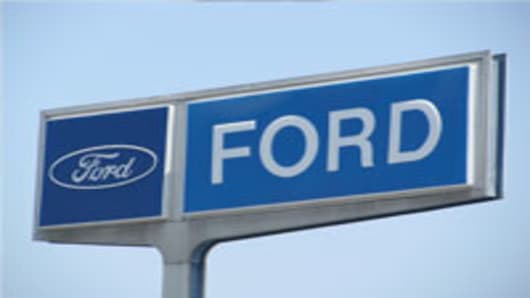US auto sales edged higher in November, led by an outsized gain for Hyundai and mixed results for rivals in a trend automakers said pointed to a grudging recovery in the U.S. economy.
Ford,Toyota and GM all reported a rise in US sales for the month of November compared to last year at the same time.
CNBC reports auto sales adjusted for the number of selling days in the month. November of 2009 had 23 selling days vs 25 for November of 2008.
Toyota was up 11.5 percent adjusted. Toyota outsold Ford during the month by about 10,000 vehicles—133,700 to 123,167.
Toyota said its U.S. sales were led by standbys like the Camry sedan and the RAV4 crossover. Hyundai sales soared 46 percent on the back of its top-selling Sonata sedan.
GM reported adjusted sales for November up 6.3 percent over the same time in 2008. GM said it planned to build 650,000 cars and trucks in the first quarter of 2010 in North America, up 75 percent from the same period in 2009 when the automaker was in a financial crisis and slipping toward a reorganization in bankruptcy.
The automaker, which emerged from a government-funded bankruptcy in July, said the U.S. auto industry's annualized sales for the month of November were expected to be about 11.1 million vehicles including medium and heavy duty trucks.
GM is in the process of dropping its Pontiac and Saturn brands and selling Hummer in its restructuring. The automaker's board was meeting Tuesday to discuss the future of Saab after a deal to sell the Swedish brand to luxury car maker Koenigsegg collapsed last week.
Ford's sales held steady in November as buyers snapped up fuel-efficient cars and crossovers, but Chrysler reported a 25-percent sales drop from dismal numbers last year.
Automakers are looking for signs of stability in the auto market, which is recovering from a historic drop in sales that began last year. Sales in October were unchanged from a year ago, and stable numbers in November could signal a recovery is under way.
Small monthly auto sales increases are likely as the economy continues its slow improvement, but larger auto sales gains will not happen until the jobless rate drops substantially, and people feel confident spending money on big-ticket items, said Martin Zimmerman, a former Ford Motor Co. chief economist who now teaches at the University of Michigan.
The U.S. jobless rate hit 10.2 percent in October, a 26-year high, and Zimmerman said people are holding onto their vehicles until the rate begins to drop.
Carmakers continued to rely on discounts and other incentive spending to sell cars and trucks last month. Sales incentives rose 2 percent in November to $2,713 per vehicle, according to the auto Web site Edmunds.com.
Ford's sales were essentially flat compared to last November, at 122,846. But sales of crossovers rose 26 percent and sales of cars rose 14 percent. Trucks and SUVs saw double-digit declines. Crossovers are as roomy as SUVs but are built on lower car frames, which improve their fuel economy.
Chrysler said it sold only 63,560 vehicles last month, and it announced an array of sales incentives including zero percent financing and cash rebates designed to draw buyers into its showrooms.
Chrysler said that despite the decrease, its market share rose to 8.4 percent from 7.9 percent in October, a sign that consumer confidence in the company is building after it released its five-year business plan earlier this month.
Ford said its hybrid sales increased 73 percent, to 2,361, as buyers gravitated toward gas sippers. At about $2.65 per gallon, regular gasoline is up around 50 cents over November of last year.
The Ford Fusion sedan, which leads the mid-size category in fuel-efficiency at 34 miles per gallon, posted a 54-percent increase from last November, shattering its previous record for full-year sales.
Overall U.S. sales are expected to rise compared with last November, when they fell to a 26-year low of 743,606, according to Ward's AutoInfoBank. Sales tumbled even lower in January and February before climbing steadily through the spring and summer.
Although the factors that drove down last November's auto sales, such as frozen credit and the stock market collapse, have abated, auto sales will not lead the economy out of recession, Zimmerman said.
"I think we have to see more of a coincident rise in the level of economic activity," he said. "I think it's a ways away. It's coming. It's not here yet."
Ford showed some optimism for the coming year, increasing first-quarter production plans by 58 percent to 550,000 vehicles. Its fourth-quarter production plan is unchanged.
Hyundai posted a 46 percent gain in sales for November and said it was on track to take a 4 percent share of the U.S. auto market this year, up by a third at a time when the rest of the industry has been reeling. The Korean carmaker benefited from a recent marketing push and lineup of fuel-efficient cars.
Also reporting November sales for 2009 was BMW. The car German maker said its brand sales rose 19.1 percent in the US vs the same time last year.
And Daimler AG DAI said Tuesday it sold 17,446 Mercedes Benz and smart vehicles in the US during November of 2009. That's up 9.1 percent from the same month last year. Sales of Mercedes-Benz increased 19 percent to 16,797 units while sales of smart cars fell 66 percent to 649 cars.
- Slideshow: America's Most Ticketed Cars


